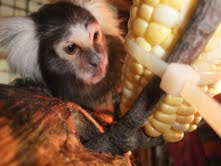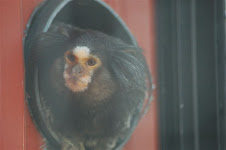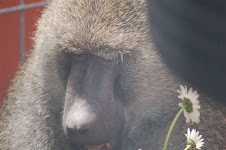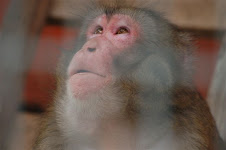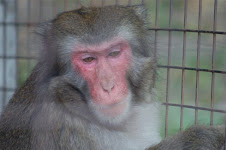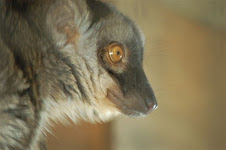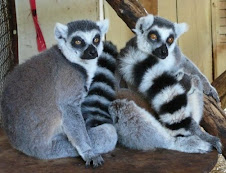Tuesday, December 25, 2012
Happy Holidays
Happy Holidays to all our SBFPS friends! May you enjoy this time with your families, friends and loved ones. Thank you so much for your continued support.
Tuesday, December 11, 2012
Press Release Story Book Farm Primate Sanctuary Welcomes Darwin
For immediate release
December 11, 2012
Darwin, dubbed the “Ikea Monkey” by media and social media has made front page headlines around the world. On December 9, 2012 this infant macaque was found wandering in a retail parking lot. Working together with other organizations, including Toronto Animal Services and Animal Alliance, Darwin is now a resident of Story Book Farm Primate Sanctuary (SBFPS) in Sunderland, Ontario. “Darwin’s story highlights the issue of exotic animals as pets” states Sherri Delaney, founder of the sanctuary. He arrived at the sanctuary and is settling in where he will be socialized with other monkeys and be provided the type of care he requires including environmental and social enrichment.
About Story Book Farm Primate Sanctuary
Story Book Farm Primate Sanctuary is a place of safety. We offer freedom from fear. We are a place of healing and recovery from trauma. In sanctuary care, we encourage friendships between residents. We encourage exploration and freedom of choice. We give back the ability to make decisions and control events that affect residents' lives. Our human caregivers exercise deep listening skills to help address the residents' wants and needs. We strive for humility and parity and look at each day as a learning opportunity. Our dedicated volunteers have extensive expertise in the care and husbandry of primates, including great apes.
December 11, 2012
Story Book Farm
Primate Sanctuary welcomes Darwin
Darwin, dubbed the “Ikea Monkey” by media and social media has made front page headlines around the world. On December 9, 2012 this infant macaque was found wandering in a retail parking lot. Working together with other organizations, including Toronto Animal Services and Animal Alliance, Darwin is now a resident of Story Book Farm Primate Sanctuary (SBFPS) in Sunderland, Ontario. “Darwin’s story highlights the issue of exotic animals as pets” states Sherri Delaney, founder of the sanctuary. He arrived at the sanctuary and is settling in where he will be socialized with other monkeys and be provided the type of care he requires including environmental and social enrichment.
SBFPS is home to twenty-three (23) other primates who have
come from private owners, roadside zoos and research. “People do not realize that monkeys do not
make good pets. When they pass infancy and mature, problems arise. Social isolation and the need to be with
their own kind results in aggression and stress behaviours. Raising them as
humans is detrimental to their development, mental and social well being.” says
Delaney. All infants need to be with their natural mothers to feed, learn
social skills and to be loved – macaques in particular grow up in groups
of infants surrounding their mother. Darwin was removed from his biological
mother to become a pet, a pseudo-human child. Infant monkeys fetch high prices,
fueling the black market trade – we are determined to find out who sold Darwin
and where these monkeys are coming from. Breeder female primates are often
exploited in the exotic pet trade and are left without their offspring, in
terrible health and grieving as mothers do. While images of Darwin in a coat
and diapers appear to indicate that he is well cared for,
albeit highly unnatural, even with the best intentions owners are not equipped
to handle a mature monkey with large canines who will demonstrate natural
aggressive behaviours and tendencies. We are frequently contacted by owners who
can no longer handle their “pet” monkey and need to relinquish them for safety
purposes – this could have been Darwin in a few years if he hadn’t escaped.
Macaques are volatile in nature and carry the Herpes B
virus, Hepatitis and many other transmissible diseases to humans, some of which
can be fatal. Owning a macaque has the
potential to put the owners and community at risk to infection and injury. There
could have been a very different outcome to this story if an injury had
occurred. Recent incidents in Canada and US have resulted in death to both
human owners and animals in their care. Currently, in Canada, no Federal or
Provincial regulations exist around the ownership of exotic animals. Municipalities are left to determine which animals
are considered illegal and on what grounds. It is illegal for Toronto residents
to own non-human primates, and so Darwin will not be returning to his previous
owner, Yasmin Nakhuda. However, once the media buzz dies down, we are willing
to work with her to ensure that she is confident that Darwin will be in good
hands with all his mental, social and physical needs met. We want what is best
for all parties involved, and we are happy to accommodate requests that are in
Darwin’s best interests.
Darwin will now live life in sanctuary care, learning to be
a monkey. He is adjusting well already, and is extremely confident for such a
little monkey. He has been exploring his enclosure, playing with all his toys
and interacting with the other monkeys in surrounding enclosures. Our hope is
that he can be adopted by one of our baboons with a maternal instinct, since he
is in need of a mother figure in his life and she is in need of social
companionship. We encourage members of the public to visit Darwin’s Facebook (www.facebook.com/ikeamonkeydarwin)
or sign up for our E-Newsletter to receive updates.
Donations for his care can be made at www.storybookfarmprimatesanctuary.com.
As this is an unexpected arrival, we greatly appreciate any contributions –
they will go a long way to securing the future of our residents.
About Story Book Farm Primate Sanctuary
Story Book Farm Primate Sanctuary is a sanctuary for primates
who come from a variety of different backgrounds. The farm is located approximately one hour
north east of Toronto in the Sunderland area. Currently, we are home to 23 primates.
We at SBFPS are committed to educating and raising awareness about the plight
of captive primates, advocate on behalf of primates who do not have a voice of
their own and help prevent cruelty to animals through the operation of a
primate sanctuary.
Story Book Farm Primate Sanctuary is a place of safety. We offer freedom from fear. We are a place of healing and recovery from trauma. In sanctuary care, we encourage friendships between residents. We encourage exploration and freedom of choice. We give back the ability to make decisions and control events that affect residents' lives. Our human caregivers exercise deep listening skills to help address the residents' wants and needs. We strive for humility and parity and look at each day as a learning opportunity. Our dedicated volunteers have extensive expertise in the care and husbandry of primates, including great apes.
Friday, December 7, 2012
Friday Facts – Meet the Browns (Lemurs that is!)
Rosie and Komoto are the two brown lemur
residents at SBFPS. As primates, they are highly social, in the wild living in
groups with up to 30 - 40 individuals. In the
sanctuary, they snuggle with each other and interact with their ring-tailed
lemur neighbours. “The Browns” as we
call them are interested in watching the humans washing dishes and working
around the barn. One of their favourite treats
are grapes – they are so cute when they eat them! They have soft hands, are gentle and love to
bask in the sun. They are flight
animals, meaning they would rather flee than fight.
· Lemurs are found on the island of
Madagascar, located off the southeastern coast of Africa in the Indian Ocean.
They have also been found to live on Mayotte,
an island to the north of Madagascar.
 |
| Rosie enjoying a grape in her enrichment! |
· Brown lemurs (Eulemur fulvus fulvus) are typically herbivores, eating fruits,
flowers, and leaves, but they will, on occasion, eat centipedes, millipedes,
and other insects. They will also consume bark, sap, and clay.
· They live in forests, both rain forests and
dry forests, ensures that they have an ample supply of food, with plenty of
plant and animal life around to nibble on.
·
They are excellent jumpers, moving from tree
to tree with ease and use their tail for balance when needed. They spend less
than 2% of their time on the ground. When on the ground, they usually run
around on all 4 legs.
· As with all of the true lemurs, olfactory
communication is extraordinarily important.
They have scent glands on their wrists and throats and use them to mark
location and as an individual “signature”.
· The brown lemur is classified as near
threatened on the IUCN (International Union of Conservation of Nature and
Natural Resources) red list of threatened species. Over the past 3 generations
(24 years) the population is estimated to have decreased by 20 to 25%. This is
mostly due to decline in both the area and the quality of its habitat in its
only known range. The brown lemur also suffers from exploration.
VOCAL COMMUNICATION
·
ohn: this is a nasal sound that is used in
maintain-ing group cohesion (we hear this all the time in the barn!)
·
cree: this high-pitched sound is used as a
terri-torial call
·
crou: this sound is the alarm call of the
brown lemur
Subscribe to:
Posts (Atom)


